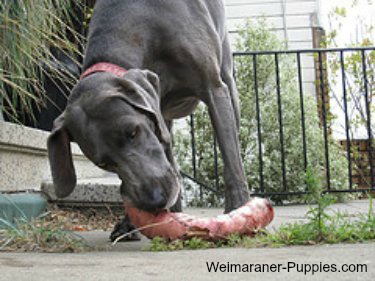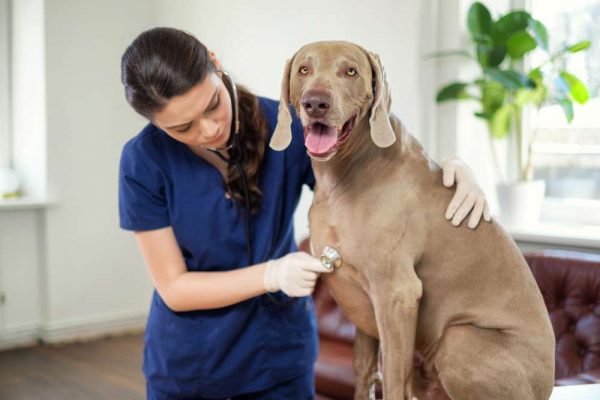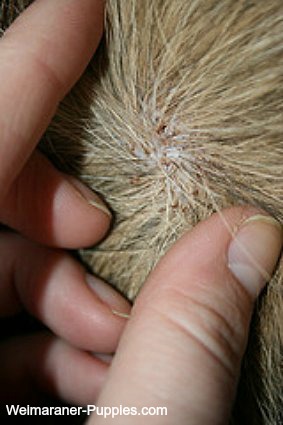Salmonella symptoms in dogs can vary, based on how serious the salmonella poisoning. So it’s important to understand which symptoms can mean that your dog has been poisoned.
Dog salmonella symptoms commonly appear in 6 to 72 hours after your dog eats food contaminated with the salmonella bacteria.
And hunting dogs like Weimaraners are exposed to salmonella bacteria more often than dogs who never leave their own yards.
In addition, dog owners can get salmonella from their dogs, just by handling their dogs, dog food and treats.
However, fortunately, there are some simple steps that you can take. Doing these things will minimize the possibility of salmonella poisoning, or salmonellosis, in your dog…

if she eats raw meat that she finds outdoors.
What is Salmonella Poisoning?
Salmonella poisoning or infection is caused by the salmonella bacteria.
Dogs and cats get salmonellosis by eating something that has been infected or contaminated with the bacteria. Something they find outside, or treats or food that you purchased at the store.
Occasionally we see dog food or treat recalls, because they contain salmonella bacteria.
Salmonella infection is a disease that is passed from animals to humans.
So, if your dog has salmonella poisoning, you can get it. You need to be very careful when you touch your dog, his toys, his food and water dishes or anything that he touches or chews on.
Get into the habit of washing your hands frequently after handing your dog or his food. And wash your dog’s toys frequently.
There is one additional way that salmonella is spread. It is found in the feces or saliva of an animal that is infected. So touching your dog’s mouth or his poop if he has salmonella, can give it to you or to other dogs.
What Causes Salmonella?
Weinheimers get salmonella in a number of ways. They are outdoor dogs who frequently come into contact with dead animals or wild animal feces.
Because of this, they are more likely than inactive dog breeds to be exposed to salmonella bacteria.
Here are some causes of salmonella in dogs:
- Eating contaminated dog food or dog treats that have been recalled. While this is not an everyday occurrence, it does happen. Read the news to stay current on dog foods and treats that are being recalled because of salmonella or listeria.
- Pig ears – Many Weimaraners chew on pig ears, and they enjoy doing so. Unfortunately, pig ears are sometimes contaminated with salmonella bacteria. Pig ears can spread the bacteria to your dog and her surroundings.
- Feces – Feces, whether from other dogs or wild animals spreads salmonella. If your dog eats feces that she finds, make sure you watch her for symptoms of salmonella.
- Antibiotic therapy – If your dog is being treated with antibiotics, her immune system is weakened. Antibiotics destroy good bacteria in her system, making her more susceptible to salmonella.
- Eating dead animals or infected birds.
- Eating raw chicken or eggs – Salmonella in eggs and chicken (that you purchase) is fairly common. If you cook eggs and chicken, they are safe.
In addition, very young dogs with immature digestive systems and older dogs are more susceptible to salmonella.
How to Recognize Salmonella Symptoms
Think your Weimaraner has been exposed to salmonella? Look for these symptoms:
- High fever – This is usually the very first symptom of salmonella that you will notice.
- Vomiting and diarrhea – Sometimes the diarrhea contains mucus or blood.
- Loss of appetite
- Lethargy – Your dog, who is normally very active, may just lie around and not show interest in taking walks or playing with you.
- Dehydration – If your dog is dehydrated, he may not pee very much, or at all.
- Miscarriage or spontaneous abortion – if she is pregnant.
Suspect that your dog has symptoms of salmonella poisoning? You should take him to the vet to be checked out. This is because salmonella is serious. And its symptoms are sometimes confused with other conditions.
Your vet will do tests to determine if your dog actually has salmonellosis. If he does, he will need to take an antibiotic.
Salmonella is very serious in dogs—even fatal. So don’t delay in getting help for your Weimaraner!






Leave a Reply